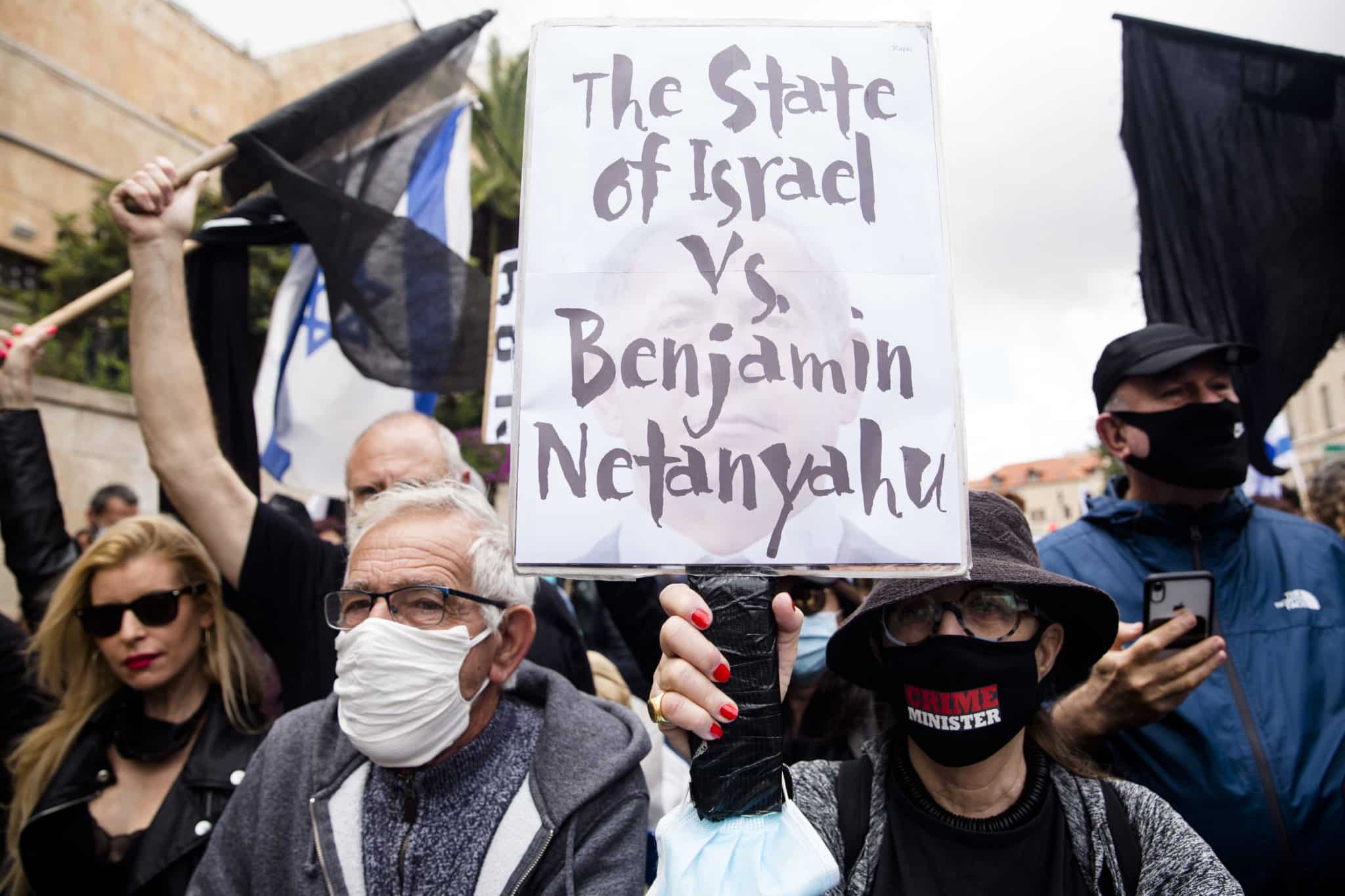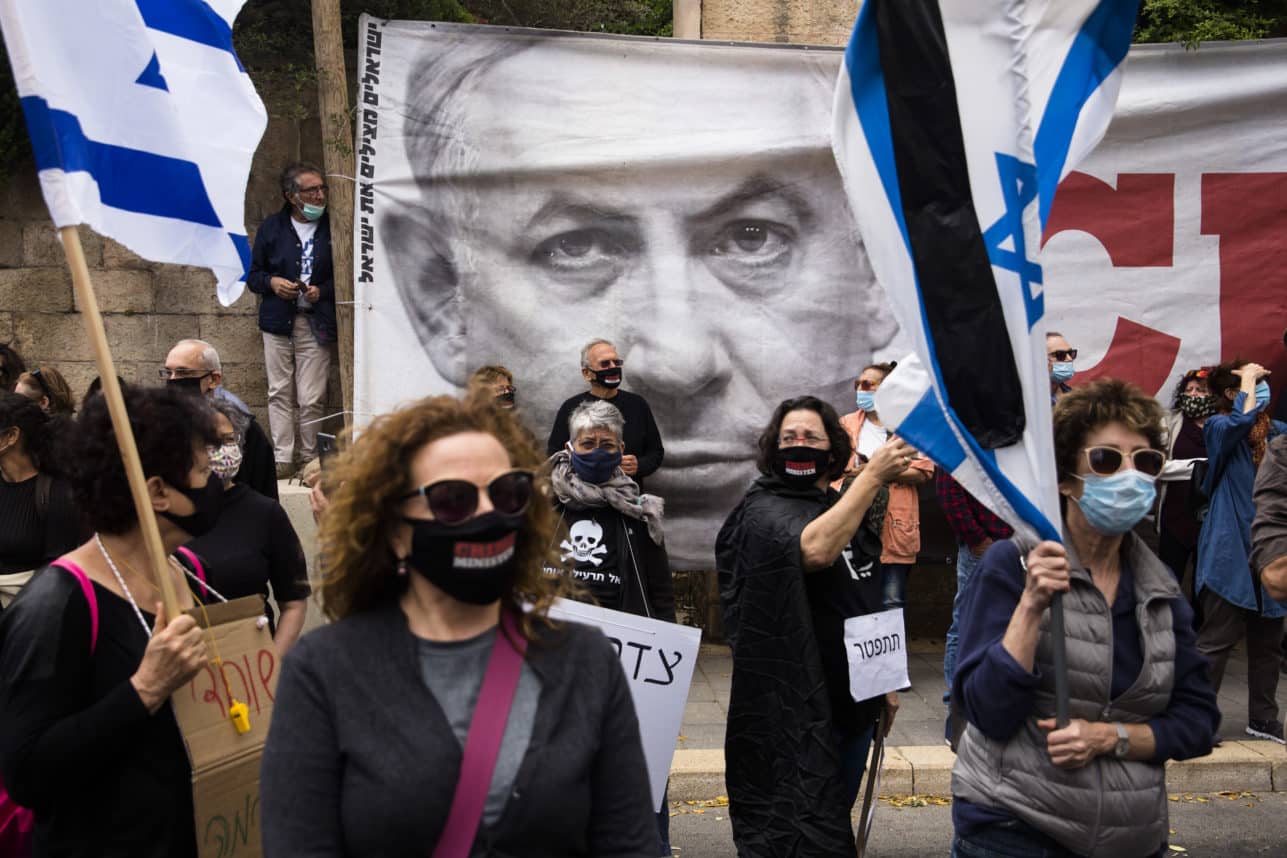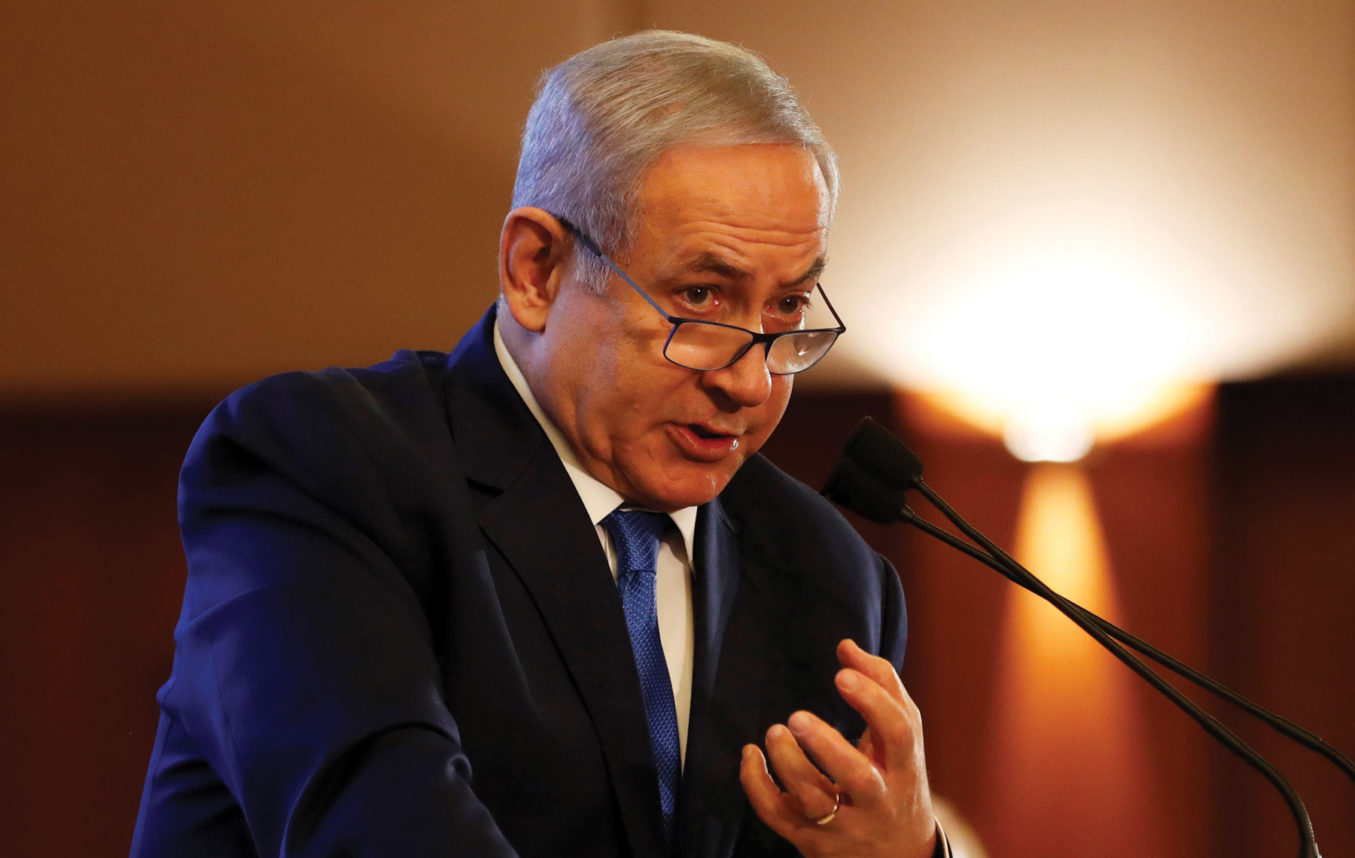 Israelis protest against Israeli Prime Minister, Benjamin Netanyahu on May 24, 2020 in Jerusalem, Israel. The prime minister, who strongly denies the charges of bribery, fraud and breach of trust, was recently sworn in to office at the head of a national unity government formed with his opponent Benny Gantz. (Photo by Amir Levy/Getty Images)
Israelis protest against Israeli Prime Minister, Benjamin Netanyahu on May 24, 2020 in Jerusalem, Israel. The prime minister, who strongly denies the charges of bribery, fraud and breach of trust, was recently sworn in to office at the head of a national unity government formed with his opponent Benny Gantz. (Photo by Amir Levy/Getty Images) When Israeli Prime Benjamin Netanyahu appeared in the Jerusalem District Court on May 24, he made political history, even though Israel has had no shortage of corrupt leaders — including Knesset members, chief rabbis, mayors and other officials — being sent to prison on criminal or security charges.
In 2011, President Moshe Katzav was sentenced to seven years in prison on rape charges. In 2008, Prime Minister Ehud Olmert resigned to stand trial on charges of bribery and breach of trust both as mayor of Jerusalem and later as prime minister. He was sentenced to 27 months on fraud charges and was discharged from prison after serving just 16 months.
But when Netanyahu appeared in front of the three judges, it was the first time that a sitting prime minister had faced criminal charges.

The timing is immaculate. After a traumatic year in which three elections failed to produce a majority government, it took the political skills of Netanyahu and the conscience of opposition leader, Benny Gantz, to cobble together an emergency unity government. Yet, even before this government had fully taken its Knesset seats, the acting prime minister set out on a marathon legal journey to clear his name.
“There will be nothing, because there is nothing,” has been Netanyahu’s drumbeat slogan.
Throughout the agonizing process of police investigations acting on the orders of the state attorney-general, Netanyahu has protested that there has been political dirty business going on aided and abetted by a compliant media. He proclaimed that the only way the opposition could get rid of him was to stage a coup using the courts as a way to remove him from power.
His lawyers have lodged over a hundred complaints of leaks to the media and prosecution witnesses talking to reporters. Leaving aside Netanyahu’s protests, let’s look into the charges against him:
Netanyahu faces three different set of charges, but all are related to over-arching charges against him of bribery and breach of trust. The most serious concerns Case 4000, where he has been charged with a media bribery scheme with the owners of Bezek and Walla communications and media companies. In this case, the owners, Shaul Elovitch and his wife, Iris, are also co-defenders with a separate legal team.
The charges claim that Walla gave Bibi favorable coverage in exchange for him making government policies favoring Elovitch’s Bezek company to the value of around 1.8 billion shekels.
Netanyahu has protested that issues relating to the communications industry rest with the ministry concerned and that several decisions have gone against Bezek. The prosecution, however, will produce as supporting evidence large amounts of letters, email exchanges, text messages and an array of witnesses, including a couple of significant people who have turned state’s witness against the prime minister.
Watch out for the appearances of Nir Hefetz and Shlomo Filber, two former aides to the prime minister. Hefetz will accuse Netanyahu of micromanaging the Walla news coverage. His court appearance is important and may take several days, with the prosecution attempting to substantiate his verbal evidence with an array of documents. To counter this, Netanyahu lawyers and the Elovitch’s lawyers may take even longer when they cross-examine Hefetz.
There have been reports that the prosecution, via the police investigation team, used excessive methods to break Hefetz in order to get him to turn against his former boss. But Filber will be a tougher nut to crack. He will make the case that Netanyahu hatched the scheme to grant favors to Shaul Elovitch via government policies, and he is expected to back up his evidence with documents.

The prosecution could also call Walla management personnel to give evidence against the prime minister. This is a touchy issue because a dozen Walla reporters have protested interference in their reporting of the prime minister.
Netanyahu’s defense will give evidence of many negative news stories against their client to prove there was no pro-Netanyahu dominance in Walla reporting. He also will protest that any communication policies that favored Elovitch were approved by named neutral bureaucrats.
It has been reported that parts of Netanyahu’s defense arguments in Case 4000 are solid. The outcome may rest on how successfully his lawyers can offset the appearance of Filber.
Case 1000 concerns huge amounts of gifts that Netanyahu and his wife, Sara, received over the years from wealthy friends. Questions have arisen regarding whether these were really friends, or patrons looking for favors. Certainly, the reports of crates of pink Champagne and boxes of expensive cigars to the couple, and rumors of Sara’s obsessive demands for clothes to meet her self-given status as Israel’s first lady, have had a grating effect on the Israeli public. However, it may prove difficult to establish any quid pro quo in the Netanyahu dealings with Sheldon and Miriam Adelson, Australian billionaire James Packer, or Israeli Hollywood mogul, Arnon Milchan.
More complicated for Bibi is Case 2000. This involves his relationship with Yediot newspaper owner, Noni Moses. Netanyahu is charged with reducing the influence of the pro-Netanyahu Israel HaYom free newspaper, owned by his former friend, Sheldon Adelson, in favor of Yediot. Adelson’s expected evidence will be interesting.
In Case 2000, Netanyahu is on stronger ground. Moses is not going to testify against himself and the attorney-general has already reduced the charges against Netanyahu from bribery down to breach of trust.
The three cases will produce a procession of star witnesses including former Mossad head Tamir Pardo, no political friend of Bibi; former Shin Bet headYuval Diskin; former national security adviser Uzi Arad; and leader of the opposition Yair Lapid (who detests Bibi). Others may include Tzipi Livni and Labour’s Eitan Cabel. Witnesses for Netanyahu will be Gilad Erdan, before he takes up his posts in New York and Washington; Ron Dermer, until recently Ambassador to the U.S.; new Knesset Speaker Yariv Levin; Ze’ev Elkin and Tzachi Hanegbi.
The initial Sunday hearing will mostly cover technical issues concerning documents that the defense has requested from the court. The trial is likely to drag on until late 2021 and possibly as late as mid-2023. If Netanyahu is sentenced, it’s probably not going to be before early 2022 and could be as late as the end of 2024.
Barry Shaw is the senior associate for Public Diplomacy at the Israel Institute for Strategic Studies.






















 More news and opinions than at a Shabbat dinner, right in your inbox.
More news and opinions than at a Shabbat dinner, right in your inbox.